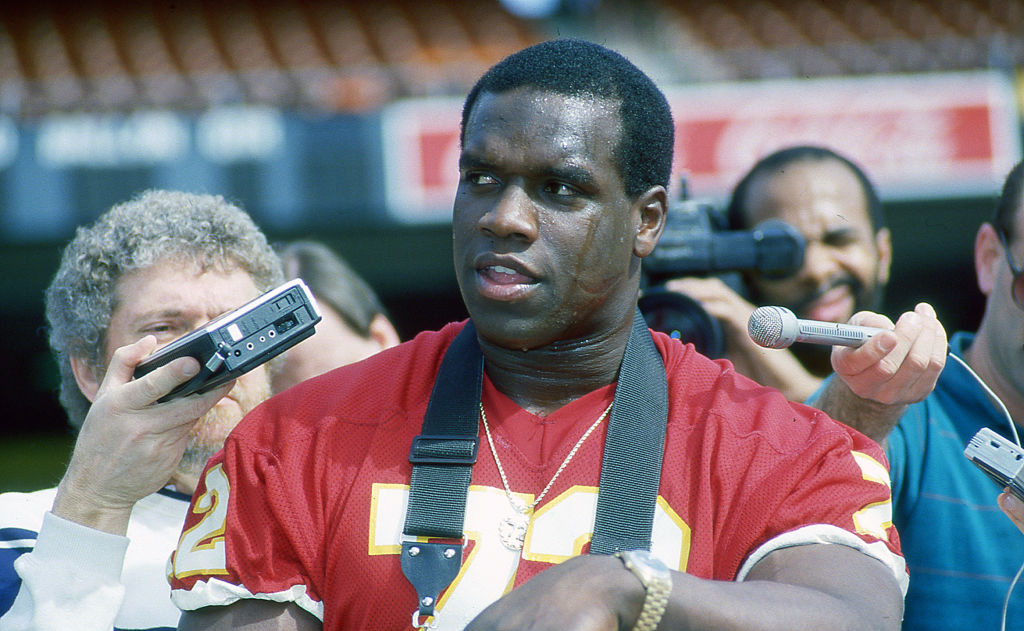NFL
Deep in Addiction, Dexter Manley Had One Prison Visitor Who Changed His Outlook

Dexter Manley was struggling. Gone were his football days with the Washington Redskins. He was suffering from addiction and he was in prison. The year was 1995 and Manley’s NFL career ended after the 1991 season. He was homeless. He was arrested in 1994 for trying to buy cocaine as his drug abuse hit its peak. Manley was arrested three other times before the end of 1995 and was sentenced to four years in federal prison. It was rock bottom for Manley. A short time into his sentence, Manley had a visitor who came in and helped him turn his life around.
Dexter Manley’s football career
RELATED: Whatever Happened to Super Bowl MVP Quarterback Mark Rypien?
Dexter Manley was a freak of an athlete. At 6-foot-3, 253 pounds during his playing days, he was both strong enough and fast enough to make his way to the quarterback from his defensive end position. Manley played his college football at Oklahoma State and was selected by the Washington Redskins in the fifth round of the 1981 NFL draft.
Manley learned to overcome obstacles – or manipulate the system – while at Oklahoma State. He was illiterate. Manley was in college reading at a second-grade level. He managed to get through the system and make his way into the NFL and carve out an 11-year career in the league, playing the first nine of those seasons with the Redskins.
Manley was a menace on defense, especially during the 1986 season. In 1986, Manley made his only Pro Bowl by racking up 18.5 sacks and returning a fumble for a touchdown. He also had four other seasons with double-digit sacks, including 15 in 1985. Manley finished his career with 97.5 sacks, collecting 91 of them with the Redskins. He is also a two-time Super Bowl champion.
Manley’s off-the-field problems
Manley was introduced to drugs while in the NFL. He stayed clean in his rookie season but became caught up in drugs after a gathering at a teammate’s house where he was in awe of the drugs and women he would have access to. In an article in SBNation, Manley recalled one woman he met at a bar that was frequented by Washington Redskins players. She invited him to join her and he knew he was about to try cocaine for the first time that night.
“The only thing I can remember is I was sitting at a table, chopping up the cocaine,” he recalled. “I’m sitting at the table listening to Johnnie Taylor, and next thing I know she comes out the bedroom with high heels and a G-string on. I was like, ‘Wow, drugs are cool.’ I had never experienced anything like it. And was on the chase since then.”
That chase led to three positive drug tests that got him suspended for a year in the NFL. After his fourth failed drug test, Manley was banned from the league in 1991. Drug abuse didn’t only kill his football career. It eventually led to multiple arrests and incarcerations.
The visitor who helped turn Manley’s life around
According to an article in resilientworker.net, Dexter Manley’s life was falling apart and he knew it. “I was trying to destroy myself,” he said, “and doing a pretty good job.” He couldn’t pay his rent and was kicked out of his apartment in 1994. He was then sent to prison in 1995 after multiple arrests related to drugs.
One week into his four-year prison sentence, a prison guard came in and told Manley he had a visitor and asked the former NFL star to change out of his orange jumpsuit and get into a white one. “I knew it was someone important,” Manley said. “I thought it might be the governor and I was just excited that I wouldn’t be alone.”
In walked former Washington Redskins coach Joe Gibbs. Manley was floored, but ultimately grateful. “I can’t tell you how much that meant to me,” Manley said while getting emotional. “Coach Gibbs’ faith was unshakeable. He talked the talk and walked the walk. Coach Gibbs left a permanent footprint in my being.”











